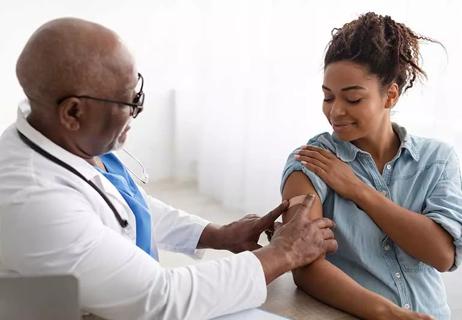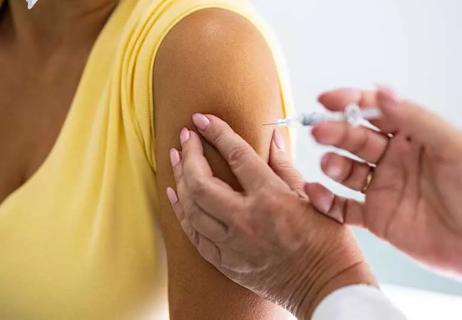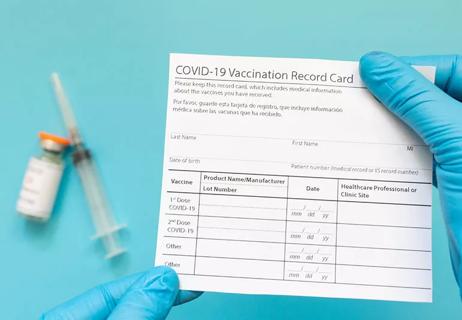Children as young as 6 months should get vaccinated, but dosage guidelines depend on kids’ ages and past vaccines

Respiratory season marks a dangerous time for kids, one filled with fevers, sore throats and airborne viruses running amok. Influenza (the flu) and respiratory syncytial virus (RSV) both peak during this period, and COVID-19 infections continue to rise and fall each year around this time.
Advertisement
Cleveland Clinic is a non-profit academic medical center. Advertising on our site helps support our mission. We do not endorse non-Cleveland Clinic products or services. Policy
The best way to keep your little one from experiencing serious illness is to make sure they’re vaccinated against all these viruses.
The U.S. Centers for Disease Control and Prevention (CDC) now recommends anyone over the age of 6 months get the latest updated vaccine for COVID-19, even if they’ve been previously infected or had previous versions of the vaccine.
Why? Because COVID-19 is still dangerous, especially for those who are young, older or immunocompromised.
“Getting your child vaccinated is the best way to protect their health,” says pediatrician Kimberly Giuliano, MD.
Still, as a parent who only wants what’s best for their kids, it’s only natural that you might have concerns about the safety of COVID-19 vaccines for kids along with questions about how and when they should get them.
Yes, the most current COVID-19 vaccines are safe for your child if they’re older than 6 months of age.
“These vaccines are safe and are effective at reducing severe disease risks,” Dr. Giuliano says. “The updated vaccine provides additional protection against the strains that are currently circulating.”
She recommends talking to your child about the vaccine, if they’re old enough, so they know what’s about to happen and what to expect. They may have heard mixed messages about vaccines.
Advertisement
“I think it’s important that kids understand that what you’re doing for them is designed to help keep them healthy and safe,” she adds. “If they’re 100% on board, the conversation will be quick and easy. But if they have questions or concerns, this is an opportunity to address them.”
Specific guidelines on how many doses of the updated COVID-19 vaccine your child should get vary based on their age and whether they’ve had previous COVID-19 vaccines.
But what counts as “up-to-date” on vaccines? We break it down for you, but also always check the CDC’s current COVID-19 vaccine guidelines to make sure none of the following has changed.
Babies are eligible for the COVID-19 vaccine once they reach 6 months old. And they should receive the same brand of vaccine for all doses.
Children 6 months to 4 years are considered up-to-date on their COVID-19 vaccines when they’ve had all of the doses in their series of shots (either two doses of the Moderna vaccine or three doses of the Pfizer-BioNTech vaccine), including at least one dose of the 2024-2025 version of the vaccine.
Here are the possibilities of what that might look like:
To clarify, that means that even if your child has previously gotten all of the doses in a series, they’ll still need a dose of the 2024–2025 to be considered up to date.
“This definitely may be confusing to figure out,” Dr. Giuliano acknowledges, “so if you have questions, talk to your child’s doctor. They can help point you in the right direction and determine what’s best.”
Like younger children, kids ages 5 and up also need the 2024–2025 version of the vaccine. But they don’t need as many doses to be considered up-to-date.
Kids 5 to 11 are up-to-date when they’ve had either:
Kids 12 and older are up-to-date when they’ve had either:
*If your child has never received any COVID-19 vaccine and you choose to get the Novavax vaccine, they’ll need two doses of the 2024–2025 Novavax vaccine to be up-to-date.
Your child may not have any side effects at all. But as with any other vaccine or immunization, they could experience some mild side effects that include:
Advertisement
“These side effects typically occur within a few hours to 24 hours after the vaccination, and they last for 24 hours or less,” Dr. Giuliano shares. “They are mild, minor annoyances compared to the alternative, which is possibly contracting COVID-19 and experiencing much more severe symptoms that last much longer.”
If your infant or young child seems to be experiencing any side effects from the vaccine, she recommends allowing it to run its course and focusing on providing comfort care at home. Keep an eye on your little one and monitor them for any changes in their symptoms.
“The good news is that we can treat these side effects with tender love and care and extra hugs from parents,” reassures Dr. Giuliano. “If those symptoms start to interfere with sleeping and eating, that’s when a dose of something like baby Tylenol® could be considered.”
If you’re already thinking about gearing up protection against the flu, RSV or any other routine immunizations, there shouldn’t be an issue with including the COVID-19 vaccines into your child’s schedule.
“If you’re in the pediatrician’s office and have the opportunity to get everything taken care of in one visit, I’d recommend doing that,” Dr. Giuliano advises. “The vaccines work just as well and are safe whether you get them in isolation or get them all on the same day.”
Advertisement
More serious side effects like allergic reactions and myocarditis (inflammation of the heart) are extremely rare.
“Serious problems from COVID-19 are more likely than serious problems from the vaccine,” Dr. Giuliano states.
In babies and young children who are unvaccinated, one of the main concerns is developing multisystem inflammatory syndrome (MIS-C) because of COVID-19. In addition, your child may also get long COVID, where symptoms linger and persist for several weeks or months at a time.
“Anyone who’s taking care of a child through a short illness knows how challenging that could be,” she notes. “That’s why it’s important to help our kids avoid getting serious cases of COVID-19.”
Plus, kids are more at risk for getting multiple infections at a time and/or back-to-back illnesses, so your child should be vaccinated even if they’ve already been infected with COVID-19.
“Getting COVID-19 once doesn’t mean they won’t get it again,” Dr. Giuliano cautions. “It’s safe for children to get the COVID-19 vaccine, and they’re going to have much better ongoing protection from future virus infections.”
To have your child vaccinated, contact your pediatrician or primary care provider to set up an appointment or ask about walk-in, same-day availability for COVID-19 vaccines. These vaccines are also widely available where other vaccines are administered, like at drugstore pharmacies.
Advertisement
If you’re still not sure where to go, the CDC has created a handy search tool that makes it easy to find local and regional vaccine availability.
Learn more about our editorial process.
Advertisement

Updated vaccinations are recommended to better protect against the evolving virus

Redness, swelling, itching and rash can happen when your body’s immune system reacts to the vaccine injection

The latest vaccine offers the most up-to-date protection

Irregularities in cycle length and flow aren’t a cause for concern

Before you panic, here are the options to consider

Our expert explains why swollen lymph nodes happen

Asking questions, creating routines and setting schedules can help get students back on track

Most kids are eligible to start kindergarten when they’re 5 — but age isn’t the only factor to consider

If you’re feeling short of breath, sleep can be tough — propping yourself up or sleeping on your side may help

If you fear the unknown or find yourself needing reassurance often, you may identify with this attachment style

If you’re looking to boost your gut health, it’s better to get fiber from whole foods